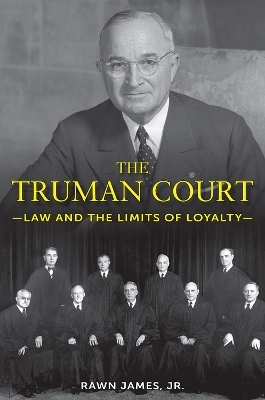
The Truman Court
Law and the Limits of Loyalty
Seiten
2021
University of Missouri Press (Verlag)
978-0-8262-2229-9 (ISBN)
University of Missouri Press (Verlag)
978-0-8262-2229-9 (ISBN)
Perhaps the most overlooked aspect of Harry S. Truman's presidency is his judicial legacy, with biographies neglecting to consider the influence he had on the Supreme Court. Yet, as Rawn James lays, as president, Harry Truman molded the high court into a judicial body that appeared to actively support his administration's political agenda.
Perhaps the most overlooked aspect of Harry S. Truman's presidency is his judicial legacy, with even the finest of Truman biographies neglecting to consider the influence he had on the Supreme Court. Yet, as Rawn James lays out in engaging detail, as president Harry Truman successfully molded the high court into a judicial body that appeared to actively support his administration's political agenda. In rulings that sparked controversy in their own time, the Supreme Court repeatedly upheld Truman's most contentious policies, including actions to restrict free speech, expand civil rights, and manage labor union unrest.
The Truman Court: Law and the Limits of Loyalty argues that the years between FDR's death in 1945 and Chief Justice Earl Warren's confirmation in 1953-the dawn of the Cold War-were, contrary to widespread belief, important years in Supreme Court history. Never before or since has a president so quickly and completely changed the ideological and temperamental composition of the Court. With remarkable swiftness and certainty, Truman constructed a Court on which he relied to lend constitutional credence to his political agenda.
Perhaps the most overlooked aspect of Harry S. Truman's presidency is his judicial legacy, with even the finest of Truman biographies neglecting to consider the influence he had on the Supreme Court. Yet, as Rawn James lays out in engaging detail, as president Harry Truman successfully molded the high court into a judicial body that appeared to actively support his administration's political agenda. In rulings that sparked controversy in their own time, the Supreme Court repeatedly upheld Truman's most contentious policies, including actions to restrict free speech, expand civil rights, and manage labor union unrest.
The Truman Court: Law and the Limits of Loyalty argues that the years between FDR's death in 1945 and Chief Justice Earl Warren's confirmation in 1953-the dawn of the Cold War-were, contrary to widespread belief, important years in Supreme Court history. Never before or since has a president so quickly and completely changed the ideological and temperamental composition of the Court. With remarkable swiftness and certainty, Truman constructed a Court on which he relied to lend constitutional credence to his political agenda.
Rawn James Jr has practiced law in Washington, D.C. for 20 years. His previous books are Root and Branch: Charles Hamilton Houston, Thurgood Marshall and the Struggle to End Segregation and The Double V: How Wars, Protest and Harry Truman Desegregated America's Military.
| Erscheinungsdatum | 24.06.2021 |
|---|---|
| Zusatzinfo | 8 photos |
| Verlagsort | Missouri |
| Sprache | englisch |
| Maße | 152 x 229 mm |
| Gewicht | 622 g |
| Themenwelt | Literatur ► Biografien / Erfahrungsberichte |
| Sachbuch/Ratgeber ► Geschichte / Politik | |
| Geisteswissenschaften ► Geschichte ► Regional- / Ländergeschichte | |
| Geschichte ► Teilgebiete der Geschichte ► Militärgeschichte | |
| Recht / Steuern ► Rechtsgeschichte | |
| Sozialwissenschaften ► Politik / Verwaltung ► Staat / Verwaltung | |
| ISBN-10 | 0-8262-2229-3 / 0826222293 |
| ISBN-13 | 978-0-8262-2229-9 / 9780826222299 |
| Zustand | Neuware |
| Haben Sie eine Frage zum Produkt? |
Mehr entdecken
aus dem Bereich
aus dem Bereich
neueste Manipulationstechniken als Waffengattung der NATO
Buch | Softcover (2023)
Westend (Verlag)
CHF 33,55
Deutschlands Schwäche in der Zeitenwende
Buch | Softcover (2023)
C.H.Beck (Verlag)
CHF 25,20


